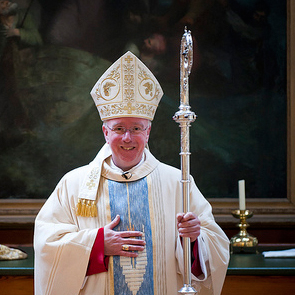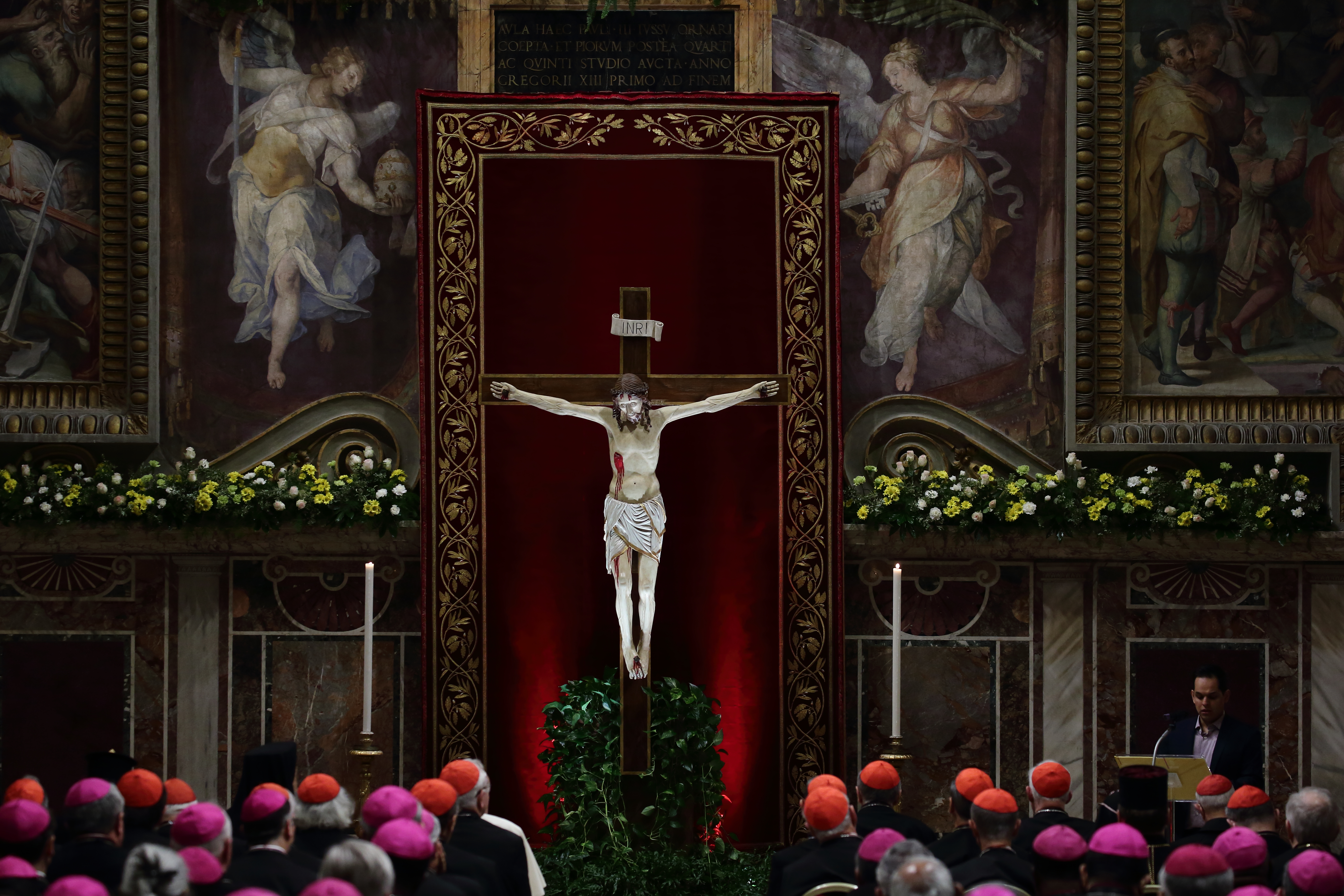Sister Veronica Openibo today spelled out in public what has so far only been discussed in private at the Vatican’s child protection summit, or just hinted at: that serious sexual abuse is happening in the developing world and some bishops are in denial about it.
The Nigerian religious sister, who is Superior of the Society of the Holy Child Jesus, told the leaders of 114 episcopal conferences, including 36 from Africa, that they must stop downplaying the problem.
“Probably like many of you, I have heard some Africans and Asians say, that ‘this is not our issue in countries in Africa and Asia, it is the problem in Europe, the Americas, Canada and Australia’,” she said during her speech at the Paul VI synod hall delivered from a seat on a dais shared with Pope Francis.
“However, I worked throughout Nigeria in the area of sexuality education for nine years and heard the stories and counselled many people. I realised how serious the issues were and still are.”
The third day of the Vatican's global gathering to tackle abuse focussed on the importance of transparency including another call to reform Pontifical Secrecy – a protocol of confidentiality used in the Church – and an admission by a cardinal that files on abusive priests had been destroyed.
Centre stage, however, was given to two powerful speeches from women, kicked off by Sister Veronica who used a disarmingly gentle and warm tone to scold bishops for their “mediocrity, hypocrisy and complacency,” saying that the Church had been “hypocrites” for keeping silent about abuse while proclaiming the Ten Commandments and parading ourselves as “custodians of moral standards and values and good behaviour”.
Sister Veronica, who has lived in Rome for 15 years, said the “clerical” church’s system of silence must end to face the emerging scandals of abuse, and that problems of war and poverty in the developing world, she stressed, is no excuse for turning a blind eye.
“In some parts of the world, including countries in Africa and Asia, not saying anything is a terrible mistake as we have seen in many countries,” she said.
“The fact that there are huge issues of poverty, illness, war, and violence in some countries in the global south does not mean that the area of sexual abuse should be downplayed or ignored. The Church has to be pro-active in facing it.
She explained that back the early 1990s she was told by a priest about “sexual abuses in the convents and formation houses” and that in her role as president of the Nigeria Conference of Women Religious should investigate.
As part of her proposals, the Nigerian sister suggested commissions be set up in dioceses across the developing world to draft anti-abuse procedures.
“They need to work out how best to face the serious issues of sexual abuse already exploding in some Asian and African countries in the same way that it has elsewhere,” she explained.
Sister Veronica also called for reforms to the seminary and formation system in religious houses, and questioned whether minor seminaries – boarding schools for boys with an interest in the priesthood – should be abolished. Minor seminaries are largely obsolete in Europe and the United States but continue in Africa and Asia.
“It worries me when I see in Rome, and elsewhere including in my own country, the youngest seminarians being treated as though they are more special than everyone else, thus encouraging them to assume, from the beginning of their training, exalted ideas about their status,” she said.
“The formation of young women religious, too, can often lead to a false sense of superiority over their lay sisters and brothers, that their calling is a ‘higher’ one. What damage has that thinking done to the mission of the Church?”
In his speech, German Cardinal Reinhard Marx, the Archbishop of Munich and member of the Pope’s advisor “C9” body, gave an exposition on how good administration in the Church can prevent abuse while stressing the need for “transparency and traceability.”
He admitted that files “could have documented terrible deeds and named those responsible” were either “destroyed or never created”. Many victims groups and civil authorities have over the years criticised the Church for its handling of documentation on abuse, and Cardinal Marx’s admission makes him one of the highest ranking figures to accept this criticism and confess that files were destroyed.
The cardinal talked about reforming Pontifical Secret system, a point made by Dr Linda Ghisoni, a canon lawyer who spoke to the gathering yesterday. He stressed that transparency was needed to restore credibility to the Church, called for an ecclesial administration that can be trusted and "acts in the name of Jesus” and an adequate legal system that punishes offenders and finds the truth.
“Objections to traceability and transparency are not particularly forceful,” he said. “Every objection based on pontifical secrecy would only be relevant if compelling reasons could be shown why pontifical secrecy should apply to the prosecution of criminal offences concerning the abuse of minors. As things stand, I know of no such reasons.”
Later on Saturday 23 February, the summit heard from another woman, Mexican journalist, Valentina Alazraki, who delivered a direct message to bishops on working with the media.
"If you are against those who commit or cover up abuse, then we are on the same side. We can be allies, not enemies.
"But if you do not decide in a radical way to be on the side of the children, mothers, families, civil society, you are right to be afraid of us, because we journalists, who seek the common good, will be your worst enemies."
Stressing that she was speaking to them "first and foremost as a mother" urged the summit participants to work with journalists.
"I hope that after this meeting you will return home and not avoid us, but instead seek us out. That you will return to your dioceses thinking that we are not vicious wolves, but, on the contrary, that we can join our forces against the real wolves."
For his part, the Pope emphasised the importance of listening to female voices in what is a male-dominated gathering.
“Inviting a woman to speak is not to enter into the mode of an ecclesiastical feminism, because in the end every feminism ends up being a machismo with a skirt," the Pope told the gathering on 22 February. "No. Inviting a woman to speak about the wounds of the Church is to invite the Church to speak about herself, about the wounds she has. And this I believe is the step that we must take with great determination: woman is the image of the Church that is woman, bride, mother.”
He went on: “It's not a question of giving more functions to women in the Church — yes, this is good, but that's not how the problem is solved — it's a question of integrating the woman as the image of the Church into our thinking… and also of thinking of the Church with the categories of a woman.
At the end of her speech Sister Veronica praised “Brother [Pope] Francis” for “for taking time as a true Jesuit, to discern and be humble enough to change your mind, to apologise and take action.”
On the evening of Saturday 23 February 82-year-old Latin American Pope sat head bowed during a penitential ceremony in the Sala Regia, located in the heart of the Vatican’s apostolic palace.



 Loading ...
Loading ...